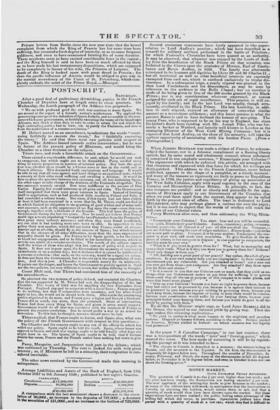When JEREMY BENTHAM was made a citizen of France, be
acknow- ledged the honour, not in a fulsome compliment or a flaming liberty When JEREMY BENTHAM was made a citizen of France, be acknow- ledged the honour, not in a fulsome compliment or a flaming liberty speech, but by some sound and wholesome counsel, whose substance i is comprised in one emphatic sentence, " Emancipate your Colonies !" The arguments with which be enforced this advice, are arranged with that clearness and expressed with that force for which his writings are distinguished. This address to the French Convention, never before published, appears in the shape of a pamphlet, at a timely moment: and many of the reasons so vigorously set forth to prove to Republican France, in 1793, the justice and expediency of giving up possession of her West India Colonies, apply with equal cogency. to the case of the Comities and Monarchical Great Britain. In principle, in fact, the two instances are parallel : and so closely and pointedly do the argu. ments of BENTMADt apply to our Government of the Coracles, that when we read them apart from the context, they appear to be called forth by the present state of affairs. The tract is dedicated to Lord MELBOURNE, who may perhaps glance a curious eye over the pages ; but it is too much to expect that the words of wisdom will reach the dull ears of our Colonial rulers.
Fancy BENTHAM alive now, and thus addressing the Whig Minis- ters— " Emancipate your Colonies ! You start : hear and you will be reconciled. T say again, Emancipate your Colonies. Justice, consistency, policy, economy, honour, genero.ity, all demand it of you : all this you shall see. Conquer,— you are still but runniog the race of vulgar ambition ; Emancipate,—you strike out a new path to glory. Conquer, it is by your armies; Emancipate, the con- quest is your own, and made over yourselves. To give freedom at the ex- pense of others, is but conquest in disguise: to rise superior to conquerors, the
sacrifice must be your own.', • • • • " What is it you want to govern them for ? What, but to monopolize and cramp their trade. What is it they can want you to govern them fur?? Defence? Their only danger is from you." s • •
Oh, but they are a great part of our power:I Say rather, the whole of your weakness. In your own natural body you are impregnable: in those unnatural excrescences you are vulnerable. Are you attacked at home? not a man can you ever get from them—not a sixpence. Are they attacked ? they draw upon you for fleets and armies." • • " Is it a secret to you that our Colonies cost us much, that they yield us no. thing—that our Government makes us pay them for suffering it to govern them—and that all the use or purpose of this compact is to make places, and
wars that breed more places?' • • •
" Give up your Colonies ! because you have no right to govern them, because they had rather not be governed by you, because it is against their interest to be governed by you, because you get nothing by governing them, because you can't keep them, because the expense of trying to keep them would be r vinous, because your constitution would suffer by your keeping them, because your principles forbid your keeping them, and because you would do good to all the world by parting with them. ' To all this the Minister might urge, as Lord JOHN Russzt.t. did in the House, the wound to our national pride by giving way. Then the sage makes this silencing replication- " To yield to justice is what must happen to the mightiest and proudest nations. Disgrace or honour follows, according to the *node. Britain yielded to America, Britain yielded to Ireland : on which occasion was her dignity hest preserved ? "


























 Previous page
Previous page